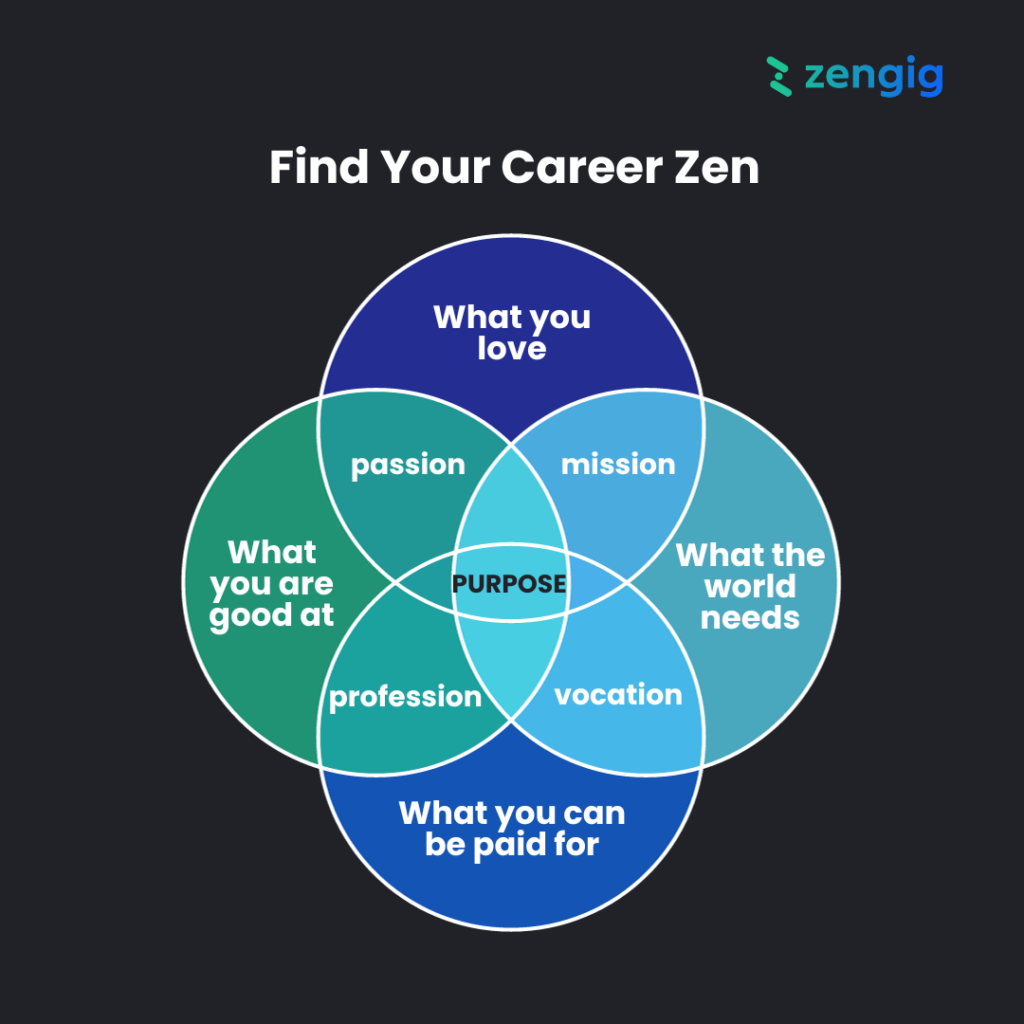How to Find Career Purpose

Last night, I received a call from a friend – frustrated and angry after her son announced that he was taking a year off from college. As the owner of a staffing company and a career advice brand, I’m no stranger to such calls…but my responses aren’t always what the parents want or expect to hear.
In short, a four-year college isn’t for everyone. Although this isn’t groundbreaking news, it isn’t necessarily the easiest thing to accept when it’s your kid we’re talking about.
As a parent of four, ages 15 – 23, I get it. Believe me, I do.
All parents want the best for their children, and the conversations in my home resemble those taking place every night across the country in households with teenagers and young adults.
We often discuss the choices and steps that lead to career success and fulfillment. Way too often, according to my kids.
A career is much more than a job
With the best intentions, high school students are commonly encouraged to follow a path of someone else’s choosing. To chase hopes and dreams that aren’t necessarily their own. Although I’m acutely aware of this misguided influence, there’s no doubt I’ve unconsciously made this mistake at times with my own kids.
Let’s call it for what it is: College feels like the safe route.
But when parents tell me they want their kids to earn a degree so they can “get a job,” I immediately think about how demoralizing that must be for a young person to hear. It’s a message that inadvertently yet immediately sets the bar much lower than it should be.
A job is just a paycheck, and while a source of income is imperative, it’s only part of the equation.
We all want and need to find our purpose, a necessity to achieve career success and happiness.
So, that’s what I talked to my friend about, just as I do with my family. The goal shouldn’t be for her son to check some imaginary box by earning a diploma but to discover his purpose – not just for today but for where he wants to end up.
I realize getting young people to look into the future is much easier said than done, but I’ve latched on to this Venn diagram and the concept behind it as a helpful tool for doing exactly that.

It’s an adaptation of “ikigai,” a Japanese concept meaning “a reason for being.”
The premise is that career purpose exists as the intersection of doing what you love, what you are good at, what you can be paid for, and what the world needs.
Rather than wander blindly into the professional world, this holistic view encourages young people to think broader and bigger when finding their niche.
What you love
This one is easy. Imagine work not feeling like work, spending your day on things you want to do instead of things you have to do.
Sounds fantastic, doesn’t it?
I suspect it also sounds like a pipe dream for most. It’s no great surprise when you consider how few people in the workforce today likely began their career journey with this thought in mind.
It’s a discovery process that can take years of exploration and first-hand experience, and even then, desires and interests evolve. The path you start down will likely have many turns along the way.
And that’s OK. Investing the time to achieve career happiness is well worth it. The resulting professional and personal benefits are immeasurable.
What you’re good at
From being a Grammy-winning singer to an astronaut who travels into space, most of us can easily create a long list of jobs we’d love to have, but for better or worse, aptitude matters.
It will come as a harsh realization for some to realize that no – you can’t actually become anything you want. Some tough love may be necessary – both for the young person trying to figure out their path and for the parent guiding them.
Despite the sting of disappointment, an individual’s strengths and weaknesses are critical factors when it comes to career potential, and as such, they must be acknowledged.
There are many subjective and objective ways to measure aptitude, from real-world trial and error to science-based testing. That’s the relatively easy part.
Once the strengths are known, the route to maximizing career potential will be revealed, which may require considerable effort. There’s no shortcut to becoming a neurosurgeon – it requires years of study and earning advanced degrees. A master carpenter must begin as an apprentice, evolving and learning one step at a time.
Whether through required formal education, self-learning, or practical experience, developing natural talents is necessary to transform them into professional assets.
What the world needs
OK, this is where things get a little more tricky, considering entire professions are currently at risk of being wiped out by AI. Apologies if you’re reading this for the first time, but the ChatGPT genie released in November 2022 isn’t returning to the bottle.
While it’s prudent to accept that what’s relevant today may become a distant memory tomorrow, it’s also a time of incredible opportunity.
Like all aspects of career success, identifying and adapting to changing needs is incumbent upon each of us individually. Call it personal and professional responsibility. It’s always existed – things are just evolving faster these days.
The goal here is to embrace the inevitable change – not fear it. Worried you don’t know what the world will need? Good news: The world doesn’t know, either. iPhones, Uber, and YouTube didn’t exist 20 years ago, and we now can’t imagine life without them.
It’s not just technology that’s evolving rapidly, either. Societal shifts are creating new industries and professions almost daily.
And while all this change is taking place, there’s a growing need for skilled workers in professions that have been around for dozens or even hundreds of years. Many trade jobs are already experiencing a labor shortage, creating extremely attractive career opportunities for those who pursue them.
What you can be paid for
Ahh, yes, money. Perhaps not the biggest factor, but the need for it is always there…looming.
Consider this the pragmatic aspect of career purpose – where passion and skill meet financial viability. Income potential must be considered when making career decisions, but this aspect of career purpose generally takes care of itself when the other three areas are properly accounted for.
So make sure you account for them.
Remember the need for aptitude? It turns out there’s no market for an aspiring artist who lacks talent, regardless of their advanced degrees and passion.
And the most gifted math prodigy won’t thrive if they despise every moment spent working with numbers.
It is also necessary to consider supply and demand, which is the ultimate driver of income. Those who develop rare and valuable skills will always have more options available to them.
Once again, there will be an investment of time and effort required…but that’s kind of the point.
It’s really crowded at the bottom of every profession – there’s always less competition at the top.

Are you being paid what you are worth?
Browse our salary data tool to know the current market value for your skills and labor!
So…now what?
Not to state the obvious, but this pursuit of purpose is extremely challenging to navigate – especially since the path to career success and fulfillment is profoundly personal and uniquely varied.
The concept of ‘ikigai’ can be a powerful tool in this journey. It encourages young adults to explore the intersection of passions, skills, market needs, and finances. It likely won’t be a linear process, either, but one filled with discoveries, evolving interests, and unexpected turns.
Although incredibly challenging at times, we need to remember that career success is not solely defined by academic degrees or traditional job titles. Meaningful, lasting success lies in finding a career that brings genuine satisfaction. What success looks like to me may differ greatly from how it looks to my sons or daughter.
Whether as parents, mentors, or career professionals, our aim should be to empower young adults to find their true path, one that leads not to a job but to a fulfilling and purpose-driven life.
Check out these 16 career clusters to help you find the right path!

